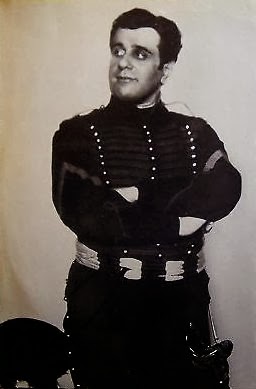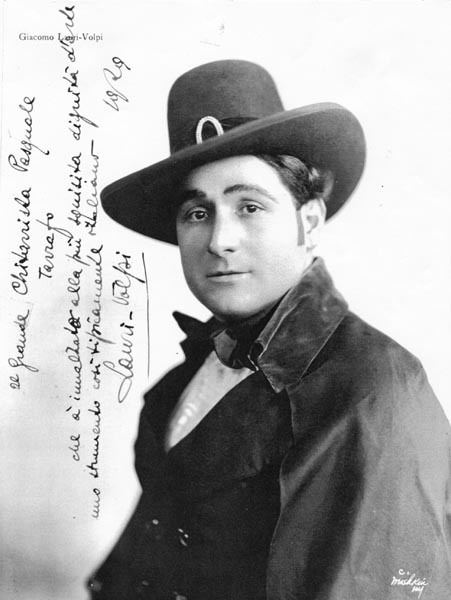|
SATURDEE OPRY LINKS 46:
Mostly Tenor Edition
  
Ariel Bybee
Josef Mann
Giacomo Lauri-Volpi
Saturdee Opry Links Overture!
"La Favorite," by Donizetti.
https://www.youtube.com/watch?v=b3rUxfQt_C4
1.
There are innumerable singers who come and go in opera, decade after decade,
singing hundreds of roles, yet are largely unknown. Such a bulwark was mezzo
Ariel Bybee, who passed away in 2018 at 75. In 18 seasons at the Metropolitan
Opera, she sang over 460 performances. In 1973, her performance of "Carmen" with
the San Francisco Opera elicited this comment from Martin Bernheimer: "Hats off,
gentlemen, a Carmen!—Her name is Ariel Bybee." Here she is singing the delight,
"Bei raggi lucenti... Dolce zeffiro," Ines's aria and cabaletta from "La
Favorite," by Donizetti. (Thanks, Laura Wagner, for the tip.)
https://www.youtube.com/watch?v=_4TaXov91Ts
About Ms. Bybee
https://en.wikipedia.org/wiki/Ariel_Bybee
Translation:
Beautiful shining rays, of the blessed aura,
the enamelled soil of white flowers
of joyful fragrance, here fragrance breathes
every one here embraces peace, love.
A divine genius watches over us,
guides us, propitiates and gives us favor
The happy destiny responds gladly
tsacred of the heart.
Silence ! Pure is the sea, serene the air
the battle already here advances
the hope directs it.
Silence! A chorus of damsels approaches the bank
Sweet zephyr, lightly blows on the sail
until it draws to this side my beloved
to make more grateful the scented sigh of the orange and jasmine.
2.
While on the subject of "La Favorite" by Donizetti, here is Fernand's aria from
this underrated opera, just to get things off to a brisk start. And to make
them extra brisk, here is Luciano Pavarotti. This is the rousing "Si, che un
tuo solo accento" just another of dozens of "hit tunes" by the great Donizetti.
The story unfolds against the background of the Moorish invasions of Spain and
power struggles between church and state.
https://www.youtube.com/watch?v=kKpVIcLBw_0
Synopsis : Fernand has met Léonore, whose beauty has caused him to renounce his
vows to the monastery (whoopeee!) and travel to the palace in hopes of meeting
his love. Léonore is also taken with Fernand but, unfortunately, she is the
mistress of the king and tells him that any relationship between the two of them
would end badly. To help him out, though, she has arranged for him to obtain a
commission in the king's army. He exults over this chance, anticipating that the
impressive deeds that he will accomplish will change Léonore's mind about their
relationship. One-track mind, this Fernand!
Rough Translation:
I did not take this love, this heart.
Great God!
that I deserve it to become
Yes, this rank, this title
and this sublime honor!
Oh yes! In a moment, a captain,
she sees me as a lover.
Yes, the love that I feel in my chest
depends on my valor.
I have sweet joy in the heart,
that we will live together
blessed in love.
So goodbye, beloved,
you are my destiny
I will come back to you I promise,
surrounded by laurel.
Saturdee Opry Links will be back after this brief word:
https://www.youtube.com/watch?v=mb0tZwBVn2E
3.
Exploring a few arias from Donizetti's "La Favorite" today, not because the
opera is a favorite, but because I don't know it. Donizetti, of course, being
the pioneer of bel canto (beautiful singing) opera who really cranked 'em out.
Good that he did, seeing as he became one of the countless artists felled by
syphilis (and, in his case, complicated by manic-depression.) Here is the great
forgotten tenor, Miguel Fleta, an astonishing story on his own, with the
gorgeous "Una vergine, un angel di Dio," from "La Favorite." Once arguably the
most acclaimed tenor in the world, Fleta made a number of bad career decisions,
capped off by a bad political one (siding with the fascists in Spain, when
Republicans failed to support music education---you know, just like they do
today!), and died at only 41 of renal failure. So as you have gleaned, the only
difference between the melodrama of opera and the melodrama of real life is. .
.one has musical accompaniment! Anyhow, here is the great Fleta.
https://www.youtube.com/watch?v=I3Eu6vSSMj4
Synopsis : Fernand tells Balthasar, the Father Superior of the monastery, that
he would like to renounce his vows because he has fallen in love with a woman.
Although he doesn't know anything about her, he does know that she is young and
beautiful like an angel and that he cannot get her out of his thoughts.
Translation (partial):
A virgin, an angel of God
at the altar she prayed with me.
A hope, a terror, a desire
the impious came down to the soul and to joy.
Ah, my father, my father!
How beautiful she was! How beautiful she was!
Ah, my father, my father!
The peace of the heart has taken hold of me.
Ah. I turn my mind to the numb. . .
About Fleta:
http://www.operavivra.com/artists/tenors/miguel-fleta/
4.
The best known aria from "La Favorita," by Donizetti, is the poignant "Spirito
Gentil," and duly so. Here is another great forgotten tenor of the past---and
one-time rival of Miguel Fleta---Aureliano Pertile. (Aria starts at 1:02.)
Pertile was among tenors famously sought by the Met when Caruso became
increasingly ill. He had a baritone quality, and a touch of the heroic, and was
well received at the Met. Yet when General Manager Giulio Gatti-Casazza went to
re-sign Pertile for a second season, he realized he had overcompensated for the
loss of Caruso, having signed what today reads like an all-star list of legends:
Miguel Fleta, Beniamino Gigli, Giacomo Lauri-Volpi, and Giovanni Martinelli.
Pertile was not re-signed, but went on to become Toscanini's favorite tenor at
La Scala. . .Not bad!
Setting: the monastery of St James of Compostella, Castile, Spain, circa 1340
Synopsis: Not knowing that Léonore is the "favorite" of King Alphonse, Fernand
asks the king for her hand in marriage and receives it because he has led
Castile to victory in battle over the Moors. Thinking that his bride is pure, he
prepares to marry her. However, before she appears, he finds out that she has
been the lover of the King. With his heart broken, he returns to the monastery
and mourns for the betrayal of his love and the loss of Léonore.
https://www.youtube.com/watch?v=JIlhkRJbux0
Translation:
http://www.lieder.net/lieder/get_text.html?TextId=23995
About Pertile:
https://en.wikipedia.org/wiki/Aureliano_Pertile
http://archives.metoperafamily.org/Imgs/PertileTosca.htm
5.
While on a forgotten tenor kick, Joseph Mann comes to mind. He was also among
the tenors hired by Met GM Giulio Gatti-Casazza to fill the void left by the
ailing Caruso in 1921 (see previous post), but it was not to be. Mann, born in
the Austro-Hungarian town of Lemburg, was a tremendous success in Europe, the
master of a good thirty prominent tenor roles (no mean achievement, seeing as he
trained originally as a baritone.) So why did he miss his Met gigs? Same reason
as Caruso: the Grim Reaper. Mann dropped dead from a heart attack on stage at
the Berlin Opera a month after Enrico. He was singing Radames from Verdi's
"Aida," as he is in this 1919 recording of "Celeste Aida," here sung in German.
https://www.youtube.com/watch?v=9IY9bzfldNY
Setting: A hall in the Palace of the Kings at Memphis.
Synopsis: Rumors of an impending war with Ethiopia have been circulating.
Radamès has just been told by Ramfis that Isis has named a new, young man to
command the Egyptian Army. Radamès wishes it were he so he could free Aida.
Translation:
http://www.aria-database.com/search.php?individualAria=7
6.
Here again is the great Josef Mann, who would have been greater had a heart
attack not stopped him at age 38. He seems to have fallen just short of
possessing the "mighty high note," but in every other respect is compelling,
commanding. Here, in another rarity, Mann sings Manrico's love song, "Ah sì ben
mio coll' essere," (sung in German as "Dass nur für mich dein Herz erbebt") from
Act III of Verdi's "Il Trovatore." This recording, one of Mann's last, was made
in Berlin for Odeon in the spring of 1921. We are lucky to have it.
https://www.youtube.com/watch?v=4xxcAsYnc6c
Setting: A room adjoining the chapel at Castellor, 1409.
Synopsis: Although the castle of Castellor is under siege, Manrico and Leonora
are about to be married. Manrico tells his love that, even if the fortress is
destroyed and he is killed, he will die speaking her name.
Translation:
http://www.aria-database.com/search.php?individualAria=513
7.
More forgotten tenor "Trovatore" excerpts. . .Here again is "Met reject"
Aureliano Pertile with "Ah, si ben mio. . .Di Quella Pira." He might not naturally have the chops to assay the big final note, but he
muscles it out admirably well. Small wonder: Pertile was known for dazzlingly
dramatic results despite possessing a voice that was not especially suave or
beautiful. It was even described by critics as "brutta" (ugly)! (I don't think
so!) Verdi roles and verismo were Pertile's forte, where he was noted for
emotional intensity (you will hear it here.) He is today thought of as one of
the best in the world, "between the wars," at least by those who are aware of
him.
https://www.youtube.com/watch?v=wryZ2oMSWmk
Setting: A room adjoining the chapel at Castellor, 1409.
Synopsis: Manrico has discovered that his mother Azucena has been captured by
the Count of Luna and is about to be burned at the stake. Furious, Manrico calls
together his soldiers and sings valiantly of how they will save Azucena from
death.
Translation:
http://www.aria-database.com/search.php?individualAria=514
8.
Okay, we've showcased two of the singers meant to "replace" Caruso at the
Metropolitan Opera in 1921, after the wondrous tenor fell into what would prove
to be a fatal illness: Miguel Fleta, and Josef Mann. Here, now, is one of the
remaining three, Beniamino Gigli (the others were Giuseppe Martinelli and
Giacomo Lauri-Volpi.) Gigli proved such a hit that (silly) audiences dubbed him
"Caruso Secondo," which was rather off the mark, considering Caruso had a dark,
heroic tenor and Gigli's was much sweeter, more contoured. Gigli stayed at the
Met until a pay dispute drove him away in 1932---well, a "pay dispute." The
skinny: Met GM Gatti-Casazza insisted that many singers take pay cuts due to the
Depression, and told the press that Gigli refused. In point of fact, Gigli had
refused to take the pay cut---but had offered to sing six operas for no pay (!),
something the GM failed to tell the newspapers. Here is a WONDERFUL 1927 film of
Gigli in "Cavalleria Rusticana" by Mascagni. Sync up the translation at 4:12
into the film with this line from the libretto, "Compar Alfio, lo so che il
torto è mio," and follow it to the end. (Full translation link below.) This will
lead to the great aria, "Mamma, quel vino è generoso" at 6:05.
https://www.youtube.com/watch?v=Ewt49c8jwbk
Synopsis : Turiddu, a soldier, has been challenged to a duel by Alfio. He is
drunk and does not believe that he will live through the duel. He tells his
mother that he is going out and asks her to take care of his beloved Santuzza if
he doesn't come back.
Translation: http://www.murashev.com/opera/Cavalleria_rusticana_libretto_English_Italian
(Start at "Compar Alfio" at 4:12.)
Pavarotti speaks of meeting Gigli:
https://www.youtube.com/watch?v=z67Nb7zHtM8
9.
The legendary Giovanni Martinelli was a great Metropolitan Opera star by 1913;
his taking over the roles that Caruso vacated in 1921 was no hardship.
Martinelli's voice was much brighter, more silvery than Caruso's warm, rich
timbre. He was a spinto (able to punch through the orchestra on big notes, but
otherwise a lyric tenor) whereas Caruso was a dramatic tenor (bigger voice.)
Here is Martinelli in 1917 with the world's greatest short aria, or the world's
shortest great aria, take your pick. "Amor Ti Vieta," from "Fedora," by
Giordano. I've never heard it sung this way, so drawn out and expansive---very
dramatic! Legato line singing (smooth, flowing), defined.
https://www.youtube.com/watch?v=X8CGH_g9nXc
Setting: a party at Fedora's house, Paris, France, late 19th century
Synopsis: Fedora has found out that Count Loris killed her fiance and swears to
avenge his death. As the first step in her plan to capture Loris, she goes to
Paris and attempts to get him to fall in love with her. Later, they are at a
party at Fedora's house and he tells her that he truly loves her.
Translation:
http://www.aria-database.com/search.php?individualAria=1123
Here is a parody of Martinelli (good-natured) by Mario Lanza. What can you say?
Tenors.
https://www.youtube.com/watch?v=ZdczFYuuUwU
FINAL BOW:
The last of the three tenors ostensibly hired at the Met to take the place of
Caruso was Giacomo Lauri-Volpe, who was to have an astounding 40-year career.
Considered one of the greatest tenors in history, he sang at the Met for ten
years and 307 performances---departing in the same Depression-era pay dispute
that drove Beniamino Gigli away. Lauri-Volpe (the "Lauri" was added to set him
apart from two other tenors with the same name) was orphaned at the age of
eleven, fought bravely for Italy in World War I, and ultimately chose singing
over a career in law (phew.) A dignified, private man, he hated publicity, and,
sad to say, making records---though many recordings survive. His longevity is
legenday: he debuted at the late age of 27, made his last opera performance at
the age of 67 and astonished the world of opera by releasing a recital disc at
81.
Here are three selections. First, here he is in his prime, or one of them, in
1922---when he was hired at the Met---with "Una Furtiva Lagrima" from
Donizetti's "The Elixir of Love."
Setting: The interior of Adina's house in an Italian village, 19th century
Synopsis: Nemorino has just taken a second dose of love potion. Unbeknownst to
him, he has also just inherited a fortune and when he enters the room, he is
flocked by the women in the room. Confident because of his dose of "love potion"
(which is really just wine), he ignores them as well as his love Adina. Adina is
hurt by this and leaves. Nemorino notices her unhappiness and realizes that she
does care for him. He sings of his joy at finding that she loves him.
https://www.youtube.com/watch?v=cJvxmk14FXk
Translation:
http://www.aria-database.com/search.php?individualAria=384
Second, here is his noble, ringing voice in a rare recording of "Donna Non Vidi
Mai" from Puccini's "Manon Lescaut." He is reportedly 62 years old here!
Synopsis : Des Grieux has just met Manon and fallen in love with her. Manon
leaves when called by her brother, but promises to return. Alone, Des Grieux
sings about his feelings for Manon.
https://www.youtube.com/watch?v=UaEu5rtk1fo
Translation:
http://www.aria-database.com/search.php?individualAria=531
And here he is at 80 (!!), singing "Nessun Dorma." Gasp.
https://www.youtube.com/watch?v=12kt5jmgZAs
Setting: The gardens before the walls of Peking
Synopsis: A herald has just announced that no one will sleep in the city of
Peking until the Calaf's name is known to the Princess. Calaf, who knows that he
has agreed to be killed if Turandot learns his name before the morning, is not
worried. He is sure that he will be the only one to reveal his name to the
Princess and he will only do that once morning has come and the Princess has
consented to be his wife.
Translation:
http://www.aria-database.com/search.php?individualAria=318
Back to Opera Links
Back to Home Page
|



